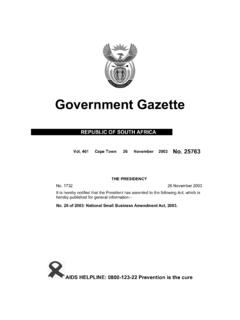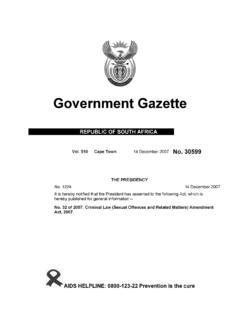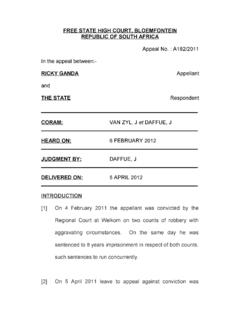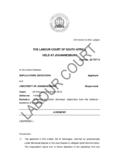Transcription of IN THE LABOUR COURT OF SOUTH AFRICA - SAFLII
1 IN THE LABOUR COURT OF SOUTH AFRICAHELD IN BRAAMFONTEINCASE NO: J 700/08In the matter between:SIHLALI, MAFIKA ApplicantandSOUTH AFRICAN BROADCASTING CORPORATION LTDR espondentJUDGMENTVAN NIEKERK JIntroduction[1]The applicant was employed by the respondent (the SABC) as its legal adviser in terms of a fixed term contract concluded on 1 August 2006. The contract was to terminate automatically three years later, on 31 July 2009. On 25 August 2007, the applicant sent a sms to the SABC s group chief executive officer, Mpofu, indicating that he quit with immediate effect . The applicant contends that the sms did not constitute a valid termination of his employment contract because any notice of termination of employment had to be given in writing and because in any event, he withdrew his resignation before it was accepted by the SABC. In these proceedings, instituted in terms of s 77 of the Basic Conditions of Employment Act (BCEA), the applicant claims his remuneration for the period August 2007 to the end of the agreed fixed term.
2 The SABC contends that it is not liable to the applicant because the sms sent on 25 August 2007 constituted a valid resignation; alternatively, because the 1applicant repudiated his contract of employment by sending the sms and failing afterward to tender his services.[2]The parties legal representatives agreed that the preliminary issues raised by the pleadings were whether the sms sent by the applicant on 25 August 2007 constituted a valid resignation and if so, whether it was open to the applicant to revoke his resignation prior to its being accepted by the SABC. I directed that evidence be led initially only in respect of those issues.[3]The applicant led evidence on his own behalf, and called a further witness, a Mr Thabang Mothibe. After the applicant had closed his case, Mr Pretorius SC, who appeared for the SABC, applied for absolution from the instance.
3 This is my ruling on that applicable principles: absolution from the instance[4]This COURT recently affirmed its power to grant absolution from the instance in appropriate circumstances. The test is whether at the close of a plaintiff s case, there is evidence upon which a COURT , applying its mind reasonably to that evidence, could or might find for the plaintiff (see: Minister of Safety and Security v Madisha & others (2009) 30 ILJ 591 (LC), referring to Claude Neon Lights (Pty) Ltd v Daniel 1976 (4) SA 403 (A)). In Claude Neon, the COURT formulated the test as follows: When absolution from the instance is sought at the close of plaintiff s case, the test to be applied is not whether the evidence led by the plaintiff establishes what would finally be required to be established, but whether there is evidence upon which a COURT , 2applying its mind reasonably to such evidence, could or might (not should, nor ought to) find for the plaintiff (Gascoyne v Paul and Hunter 1917 TPD 170 at 173, Ruto Flour Mills (Pty) Ltd v Adelson (2) 1958 (4) SA 307 (T) Harms JA approved this approach recently in Gordon Lloyd Page & Associates v Rivera & another 2001 (1) SA 88 (SCA) at 92 G, where he added.)
4 This implies that a plaintiff has to make out a prima facie case in the sense that there is evidence relating to all the elements of the claim to survive absolution because without such evidence no COURT could find for the The evidence[5]It is common cause that the applicant s contract of employment no longer subsists. The applicant s contract contemplated that he would be employed for a period of 36 months, from 1 August 2006 until 31 July 2009, when the contract would terminate automatically . Despite the contemplated duration of the contract, the SABC s personnel regulations (which form an integral part of his contract of employment) contemplate a prior termination at the initiative of either party. The relevant clause in the regulations reads as follows: TERMINATION OF SERVICE(a)An employee s services may be terminated at any stage for misconduct, incapacity, poor performance or for 3operational requirements of the Corporation or for any reason justified in law.
5 (b)With the exception of staff appointed on extraordinary terms and conditions of employment, and subject to the provisions of Part VI of these legislations, the services of any employee may be terminated in writing as follows:(i)One (1) week s notice if the employee has been employed for four (4) weeks or less;(ii) Two (2) weeks notice if the employee has been employed for more than four (4) weeks but not more than one year;(iii) Four (4) weeks notice if the employee has been employed for 1 (one) years or more.(c)..(d)The Group Chief Executive may, in his discretion, agree to a shorter period of notice given by an employee. Where an employee gives a shorter period of notice and the Group Chief Executive accepts the shorter period of notice, the employee shall not be entitled to receive notice pay in lieu of that period of notice which the Group Chief Executive has agreed to waive.
6 [6]The material facts preceding the sending of the sms to Mpofu on 25 August 2007 are briefly the following. In late 2006, the applicant, who was head of the SABC s legal department, commenced an investigation into breaches of the Public Financial Management Act by senior SABC officials. The investigation culminated in a memorandum submitted to Mpofu recommending that disciplinary steps be taken against two senior executives, including the chief financial officer. In April 2007, the applicant 4was advised that a resolution had been adopted to investigate the law firm of which the applicant was a director prior to his appointment at the SABC, following allegations that emanated from the SABC s internal audit department. The applicant denied any impropriety, but agreed with Mpofu that he would take two weeks leave during which the audit committee would conduct an investigation.
7 The applicant returned to work on 15 May 2007, and after further discussion agreed with Mpofu that he would take further special leave until 5 June 2007. When the applicant returned to work in July 2007, the Mail and Guardian newspaper requested the applicant to respond to allegations apparently contained in an internal audit report, which the applicant had not seen. On 20 July 2007, the applicant obtained an interim interdict against the Mail and Guardian, preventing the publication of any allegations contained in the report. On 21 July 2007, the applicant sent a sms to Mpofu, stating that he intended to resign. He met with Mpofu on 22 July, and after a discussion with Mpofu, the applicant agreed not to resign. The Mail and Guardian later succeeded in having the interim order discharged, and published an article on 3 August reporting the allegations made against the applicant. On 13 July 2007, the applicant received a letter from Mpofu calling on him to furnish reasons why he should not be suspended pending a disciplinary enquiry.
8 The applicant again brought an urgent application in the High COURT , this time seeking to interdict a meeting convened to decide whether he should be suspended. The application was dismissed. On Saturday 25 August 2007, the SABC issued a press statement to the effect that the applicant had been suspended on full pay pending a disciplinary enquiry.[7]The applicant testified in these proceedings that at approximately 11h30 on Sunday 25 August, he sent Mpofu the sms stating that he quit with immediate effect . He did so after the accumulation of the events referred 5to above, the catalyst being a radio news bulletin broadcast earlier that morning in which his suspension was announced. The applicant stated that at this point, he felt that he was being sacrificed he considered that he had been unfairly accused of misconduct, and was not getting the support to which he was entitled.
9 Feeling betrayed, angry and in a blood rush , he decided to resign, and sent the sms.[8]The applicant testified further that in the period between 25 August 2007 and 11 October 2007, he had a vague recollection of events. He spent time at home, seldom venturing out, in what he described as a dark period of his life. During this period, he realised that he was not thinking straight when he sent the sms to Mpofu and that, looking at the longer term implications, he was concerned that it could have been construed as an attempt to avoid the disciplinary charges against him. The only way for him to clear his name and reputation was for the enquiry to proceed, so that the matter could be cleared up one way or another. For these reasons, on 11 October 2007, the applicant sent Mpofu an email. The email read: Dali my contract still subsists. You should proceed with your disciplinary charges within the next 14 days.
10 Otherwise I will take it as repudiated. [9]On 12 October 2007, Mpofu s executive assistant sent the applicant the following email: Mafika6 Thank you for your note Dali is currently in Korea and his cell phone is not working, but I will try to get it to the meantime, please receive the attached letter that I have been trying to send you for the last two weeks without success as we never find anybody at the address on your personnel file (8 Rudderford Street, Sunninghill) [10]The attached letter, dated 28 September 2007, reads as follows: Dear Mr Sihlali,TERMINATION OF EMPLOYMENT RELATIONSHIPI wish to confirm that on 25 August 2007, you sent me an sms indicating your decision to resign your employment with the SABC. On the same day you made statements to the media announcing the same accepting your decision I subsequently sent you a massage to submit a letter of resignation, which you have wish to reconfirm that from the SABC point of view your resignation was accepted and that you are now obliged, before 31 October 2007, to return any property of the SABC within your possession and control and to finalise any outstanding matters with the Human resources Division.










